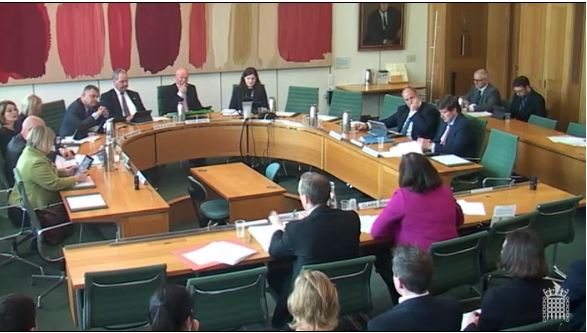
Planning guidance on fracking inquiry. Photo: Parliament TV
Government ministers were questioned by MPs last night about their proposals to take fracking decisions out of local control and scrap the need for planning applications for exploration sites.
Energy Minister, Claire Perry, and Local Government Minister, Dominic Raab, appeared last night before the Housing, Communities and Local Government Committee which is investigating planning guidance on fracking.
They were questioned on a written ministerial statement, issued last week, which announced a consultation on classifying fracking applications as Nationally Significant Infrastructure Projects (NSIP). This would mean proposals would be decided by a government-appointed planning inspector, rather than the local authority.
The written ministerial statement (WMS) also proposed making non-fracking applications permitted development so that developers would not need to apply for planning permission. The government additionally announced a planning application brokerage service and a consultation on a single shale gas regulator.
The ministers said the proposals would “streamline” decisions on fracking schemes. But Claire Perry denied they would relax regulations:
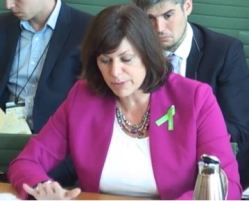
Claire Perry, MP Source: Parliament TV
“There has been a highly complex interplay between regulations and planning which means that the applications are taking a long time and creating uncertainty for local authorities and for developers.
“But I’ve had no sense whatsoever that there is a desire to lighten the regulatory burden.”
Key points
- Only production applications would be decided as Nationally-significant Infrastructure Projects
- Only exploration applications could be decided under permitted development
- No current definition of exploration or whether shale gas well sites would qualify for permitted development
- No current criteria on the scale of plans to qualify for the NSIP regime
- Brokerage service would work with local authorities and companies but opponents don’t need support
- No plans to consolidate planning guidance documents
- No need for a new definition on fracking but no response on whether the use of CO2 or acid qualified as fracking
- No comment on specific applications, local plans or a new report on seismic risks of fracking in coal mining areas
- “No contradiction” between a 2015 WMS on national importance of shale gas and the government’s Clean Growth Strategy
- “No desire to lighten the regulatory burden”
- Oil and gas licensing would stay with the Oil and Gas Authority
- No comment on which applications have been “disappointingly slow”
- Confusion over what legislation is needed for the changes
- Consultations expected before the summer recess but no timeframe for implementation of proposals
Details
Permitted development
Housing minister, Dominic Raab, was asked whether the permitted development proposals went against the concept of localism. He said:
Dominic Raab, MP Source: Parliament TV
“There are still opportunities for local consultation and local buy-in particularly if you have a pre-condition as part of that process.”
He said the proposal was “at the formative stage”.
Developments that needed an Environmental Impact Assessment could not be treated as permitted development, he said.
Energy Minister, Claire Perry, said local authorities had the power to remove permitted development rights. She said:
“Exploration is temporary and it is subject to pre-conditions. Why would local authorities not want to go through that process to see if there is a valuable resource which could benefit their local communities, both in terms of jobs and economic impact?”
Thirsk and Malton MP, Kevin Hollinrake, whose constituency includes Third Energy’s fracking site at Kirby Misperton, asked whether permitted development would include well pad construction.
Dominic Raab replied
“The principle is that it is only in relation to the exploration phase. One of the things we will want to look at very carefully is the definition around that.”
Kevin Hollinrake said:

Kevin Hollinrake, MP Source: Parliament TV
“These well pads are significant pieces of infrastructure. If you can simply put one anywhere on a permitted development basis – that will cause real concerns”.
Dominic Raab said he would feed in these concerns.
Kevin Hollinrake asked:
“Would a test frack be considered under permitted development?”
Dominic Raab replied:
“The key distinction is between exploratory operations and ones for production. But which side of the line that would fall on I am afraid I am not the expert and we shall …
Claire Perry intervened:
“We do need to set quite clear guidelines. PD [permitted development] will need to have very clear guidelines. If it is to be successful.
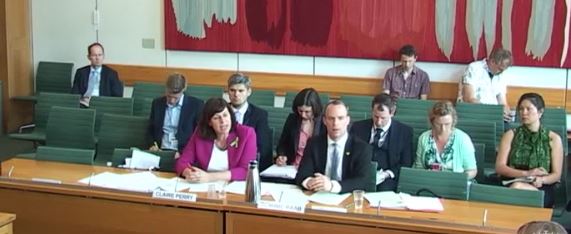
Claire Perry and Dominic Raab Source: Parliament TV
Nationally significant infrastructure projects
Dominic Rabb said NSIP was a “tried and tested” system in the transport sector and was used for the Hinkley Point nuclear power station.
The ministers were asked if the NSIP proposal was just about speed. Claire Perry said:
“It is a predictability question. You have a one-year statutory time frame. You have national policy statements that establish a need for that particular investment and provide the basis for the decision. It does bring together this one-stop shop for planning and consents and representation.”
At an earlier select committee hearing, Ineos said NSIP was not suitable for individual well applications, while campaigners and some local authorities regarded it as undemocratic
Kevin Hollinrake asked how NSIP would deal with the cumulative impact of shale gas, which concerned people:
“It has to be acceptable locally as well as nationally. And to have a social licence there’s a concern not just about one individual well pad but the ongoing cumulative impact of these developments.”
Claire Perry said:
“We would need to be clear about what the threshold was, whether it was an extraction volume, a number of wells.
“Understanding the cumulative impact and concerns of local communities in that would be a really important part of that process.
“We would need to provide a bespoke definition for trigger points.”
She rejected the suggestion that the government wanted to “turn out beautiful countryside into some scorched Texas”
Shale gas application brokerage service
Claire Perry said the brokerage service would “assist local authority decision-makers through the process so all sides are aware of what is happening”. But ministers did not appear to think it was for opponents.
Dominic Raab said:
“The brokerage service is there for the local authority and the developer and one of the things it will do is develop positive engagement with all the statutory consultees. If we weren’t doing this, your committee would be criticising us.”
Claire Perry said:
“If you’ve got 36,000 expressions of concern, most of which are not coming from the local area, there’s a suggestion that those who want to oppose these developments don’t need any more support than they’ve already got.”
Asked what evidence there was for a need for the service, Claire Perry said:
“The feedback from Departments is that there are various levels of planning policy and these are often decisions made that are extremely controversial in the local area, often by outside influences, and we need to make sure local authorities have all the support they need to work through them.”
Liz Twist put it to ministers:
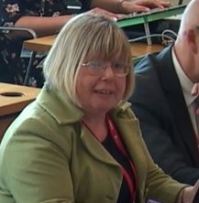
Liz Twist, MP Source: Parliament TV
“Some may see this as a way of pushing through contentious applications more quickly.”
Dominic Raab replied: “This is all about the process.”
“I think it is procedural and process learning.”
Claire Perry said:
“This is a very nefarious line of questioning. We all face controversial planning decisions in our local authorities and this is meant to be helpful to incredibly hard-pressed councillors and officers.”
She added:
“The idea that somehow we want to set up and fund something to give people reason to get round legislation and planning guidance that we’re bringing in, I’m afraid that I completely reject that.”
Matt Western MP said:
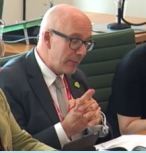
Matt Western, MP Source: Parliament TV
“Perception is a very important thing and how this will come across to communities is that it is very much a skew towards the applicant getting something through.”
Claire Perry replied:
“I think it behoves all of us to be responsible when we talk about this industry and the benefits it might bring to the local economies.”
Delays in decision-making
The Written Ministerial Statement said decisions on shale gas applications had been “disappointingly slow”. Dominic Raab said:
“We have had seven planning applications for shale gas so far and of those seven decisions that were taken by the local mineral planning authorities they took between 70 and 82 weeks to get to a decision when the statutory timeframe is 13 weeks from validation from application to decision, taking 16 weeks if there is an environmental impact assessment.”
But when pressed by the committee to name the authorities, he said:
“We are not going to start singling out individual local authorities. We are in the business of supporting them. As a general matter, …. We are not getting anywhere near overall to the statutory timeframe.”
Claire Perry said:
“All of them were outside the statutory limits.”
An earlier committee hearing had evidence from Andrew Mullaney, the planning manager at Lancashire County Council. He denied that local authorities were slowing down the process.
Limits on shale gas development
The WMS said local minerals plans should not “set restrictions or thresholds” that “limit shale gas development without proper justification.” Kevin Hollinrake asked the ministers what this meant.
Dominic Raab said he was reluctant to be drawn into a hypothetical question. Kevin Hollinrake said:
“It’s not hypothetical in that it is in your statement. You must understand therefore what that sentence means…. What would be a proper justification?”
Dominic Raab said:
“We need to respect that ultimately it’s for the local authorities to make those determinations. There’s a process, the integrity of which we want to preserve and ultimately if appealed it may come to us, in which case I don’t want to prejudice it.”
Kevin Hollinrake asked:
“Would a proper justification be the protection of other parts of the economy in an area for example?”
Dominic Raab replied:
“There will be further guidance in due course but I’m not going to give edicts on what it might mean in individual cases. The guidance needs to stand on its own two feet.”
Definitions
Claire Perry said the government proposed to resolve the differences in the definitions of fracking the Infrastructure Act 2015, which is based on volume of fluid used, and the wider view in mineral planning guidance.
She said there was a risk that not setting a volume limit would mean the definition would “catch conventional drilling”.
But Kevin Hollinrake said many of his constituents were concerned that the industry wold use the volume definition as a loophole to start fracking in protected areas.
The North Yorkshire Minerals Plan has adopted a definition based on pressure needed to fracture rocks.
Dominic Raab declined to comment on this definition. The ministers were also unable to answer whether using carbon dioxide or acid to force out gas counted as fracking according to the Infrastructure Act.
Report on seismicity and fracking
A report by geologist, Professor Peter Styles, is due to be published this afternoon which warns about the risks of earthquakes caused by fracking in former mining areas. (See DrillOrDrop interview)
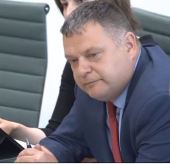
Mike Amesbury, MP Source: Parliament TV
Mike Amesbury MP asked how scientific evidence like this was provided in the current or proposed guidance.
Dominic Raab sad the guidance was reviewed regularly and innovation was “going on all the time”
“We want to make sure that the guidance clearly reflects the national context as well as local circumstances to make sure it is fit for purpose and we do periodic reviews of guidance. But also we keep it up to date on a case by case basis where that is necessary.
“On the environmental side of it, that is regularly and persistently kept up to date.”
Claire Perry said the Oil and Gas Authority, which regulates seismicity, requires operators to stop activity if any seismicity is measured, “even as low as the tremors of a roller coaster”. She said:
“the monitoring regime is both robust and we have a very good regulator in the OGA who are prepared to stop if there is any sense of seismicity being a risk.”
Asked whether Professor Styles’ report should be taken into account when authorities consider planning applications, Dominic Raab said he didn’t want to prejudice current planning applications.
“Local authorities will take account of any guidance if there is lack of clarity.”
Claire Perry said:
“Of course there should always be scientific debate but we should be very careful not to single out any particular report and prejudice any individual application on that basis because we have had the world’s best scientists review this industry for many years.”
Asked again, Perry said authorities should take account of the ”overwhelming bulk of academic and on the ground evidence”.
She said the risk was “very very low”.
Clean growth strategy
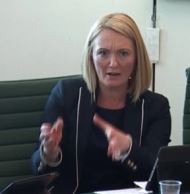
Jo Platt, MP Source: Parliament TV
Jo Platt MP asked whether there was a contradiction between the 2015 WMS on the national importance of shale gas and the government’s Clean Growth Strategy, which did not refer to shale gas.
Claire Perry replied:
“Not at all”.
She said:
“I am extremely comfortable to be a world leader in setting our climate change ambitions and using gas, particularly gas sourced domestically.”
Asked by Jo Platt why it was harder to install a wind turbine than a fracking rig.
Claire Perry said:
“There was a political decision, put in the manifesto, that we would not bring forward large=scale onshore wind for England and that commitment still stands.”
Categories: Politics


Confusing oil with gas production I see Martin. Also if ethane and plastics aren’t your interest then perhaps flicking a declining business on to someone who can make money out of it for other purposes is probably a no-brainer.
Oil and gas prices not connected in your world, PhilipP? In the real one, they are.
Take off the blinkers and you will find the INEOS business is somewhat more diverse than you suggest. But, of course, you know that and think others will not. They will though, PhilipP. Many can research a corporate structure, although I appreciate it may take a bit more effort with INEOS than with Barclays.
Seems a bit early to give up on the two thirds.
Please elaborate on how you think cheap Petroleum Exports (as in the P and E of opec) were expecting to force shale gas producers out of business. The fact that there’s an overlap of interests with several companies involved is true, but that’s a coincidence and a different argument. No, it’s you who hoped people wouldn’t notice. Perhaps you should research the meaning of ‘petroleum’ Martin.
Then there’s your other new (bonkers) hobby horse about the costs of shale production plummeting. Yes, when you’ve got a saturated drilling market in the States with lots of drilled and completed wells left over from down turns and bankruptcies, just waiting to be fracked, and more redundant plant than you can shake a stick at, and intermittently employed suppliers competing to stay in business, you have a recipe for very keen pricing. How long (if ever) would it take to reach that critical mass in the UK? It’s not going to be cheap here – mark my words.
[Typo edited by moderator]
… ‘More than 100 oil & gas sector companies filed for U.S. Bankruptcy Court protection since mid-2014.’ [reported mid 2017 – Philip] Src: https://seekingalpha.com/article/4075662-post-chapter-11-oil-and-gas-stocks-good-assets-freed-shackles-debt
Hey Philip, Did you read the story about how many oil and gas companies had not filed for bankruptcy since mid 2014? LOL. It’s a boom and bust sector, and it has been since the beginning of its history. So if you think that pointing to bankruptcies “proves” anything, that’s your business. Facts stand in between you and a solid point, I’m afraid. Oh, and BTW, you’re losing. You get that, right?
yeah right
Bravo to Claire Perry. Well done.
I thought your Barclays problem was a one off, as you indicated, PhilipP. However, you really do not have any idea about the oil and gas market, do you?
Could be an idea to become acquainted with it, rather than selecting individual links and thinking that is the whole picture.
But, the whole picture is not the one you want to propose, so you will not. Meanwhile, back in the real world the two thirds will not be convinced. Maybe they will continue to read about the record number of rigs being mobilised in the USA and wonder how that happens when there is only bankruptcy at the end of it. (I can assure you, American oil and gas businesses are not dummies, although there will be those amongst them who are, and fail, just like in any other sector.)
I’m not sure many will mark your words reference what might happen in the UK when your grasp of the basics is so poor. Think they may be more inclined to take note of someone who does understand the basics, and makes good decisions -most of the time. Someone like Jim?
The proof will be in the history Martin. I regularly supply bigger facts about the O&G world (as above) which are equally regularly side-stepped and avoided by the likes of yourself and EKT whose main interest appears to be in the snake oil and gas markets (my variation on an extended metaphor).
Hmmm. Let’s see – someone like Jim understanding the basics? someone who says fracking in the US raises no health or environmental issues? history Martin, history, not ‘his story’.
History?
“Diesels can run on cooking oil (absolutely true) , and most farm vehicles do (total twaddle)” Hmmm.
Some statements need to be taken in context, (not all fracking in the US raises any health or environmental issues, some may.) You need to consider these things within the common sense test. If this was not the case, in USA, which withdrew from the Paris Agreement largely because of how litigation in their country would run riot, every fracking site would have been sued into oblivion. Hopefully, Jim is aware of potential issues, and how to mitigate against. No different to any of his other operations-including his football club.
Shipping gas across the Atlantic, or up from the Middle East, will raise health and environmental issues. Which is the greater? Beyond my pay grade, except I do prefer the option that such health and environmental issues will have the mitigation of UK taxes to deal with them in one situation, but not the other.
Who is mister “Hmmm”? If you’re going to use an exact quote then please give a source (that wasn’t mine).
Let’s apply common sense then to the litigation test. What do you fancy the chances of a claimant beating corporation with a market capitalisation of billions and an army of attorneys where you can barely afford even one attorney (if that)? Have you even tried? … and where the laws are stacked in favor (increasingly) of the polluters and various loopholes can be applied to get corporations off the hook, and with mechanisms in law to preempt and bar class actions … where there has been insufficient (prior) baseline monitoring, independently verified, to establish a scientific case for ground contamination by a gas/drilling corporation.
… As a Colorado resident recently observed – their business model seems simple: a gas/fracking company moves into an area; drills, fracks and contaminates it; you challenge them about the pollution; they say ‘prove it’; you can’t (scientifically), and don’t have the resources to do so – (it would require a time machine and expensive continuous monitoring – prior to the drilling); they move on.
PhilipP-you need to understand two more things:
Litigation in USA is not curtailed by how much money you have. It is how much money the lawyers can make, if they are successful. It is an industry that will find any loophole to exploit financially-and it has not in respect of fracking. That is a pretty good common sense clue. I have worked for global operating, American owned companies, and know how careful they are to guard against that.
No it was not you-but you need to record the quotations from your glorious leader, otherwise re-education will be ordered again. Clear now? Or, maybe, you have followed my normal practice, and have edited those contributions? After that classic, I have re-introduced the practice.
Just my way of suggesting there are others who claim knowledge on this site falsely, when research would be pretty straight forward, either to themselves or their imagined audience Remember, I did ask about Pug’s tails, and then within a short time when the answer was not offered, checked it out and found the information.